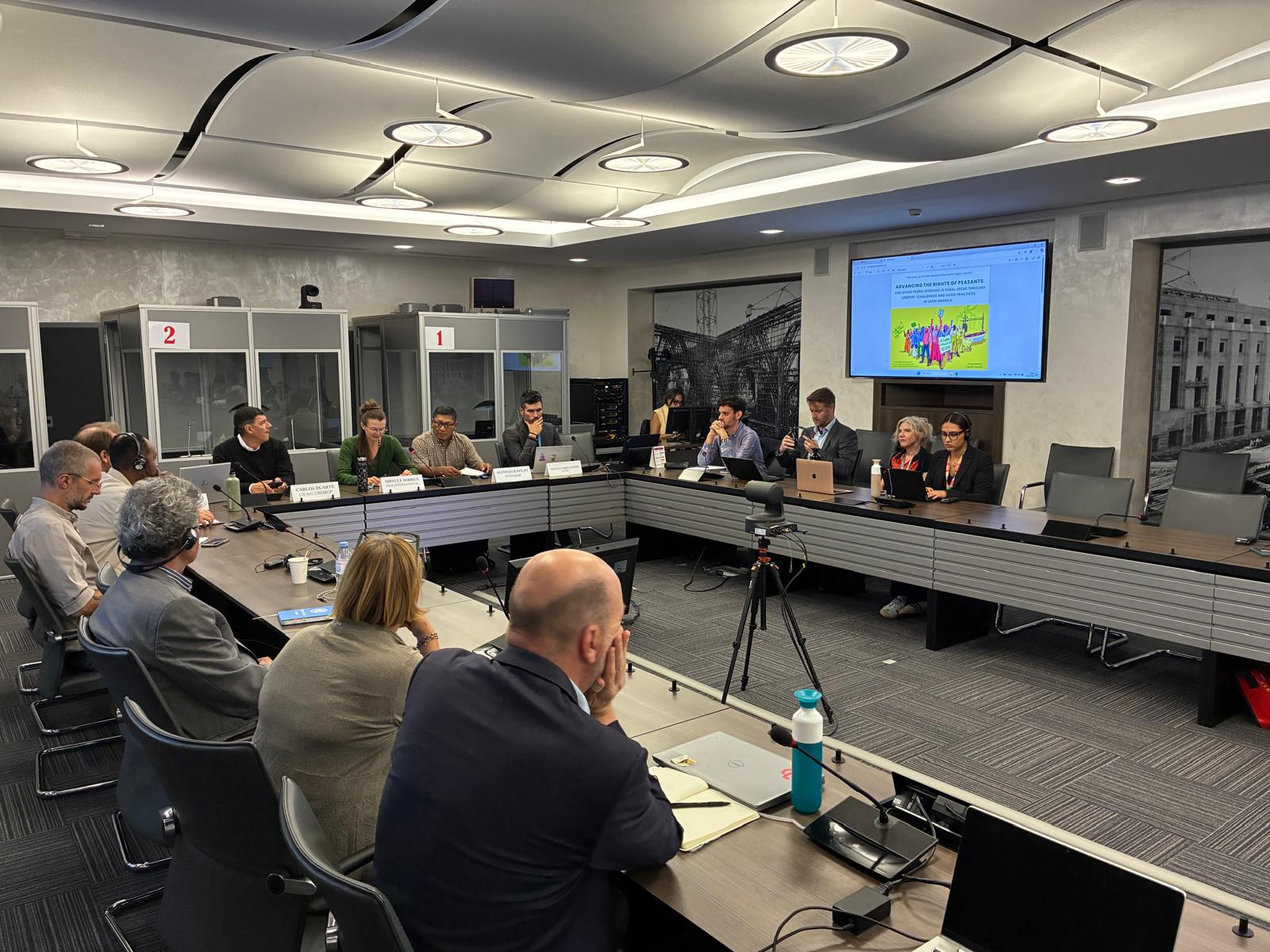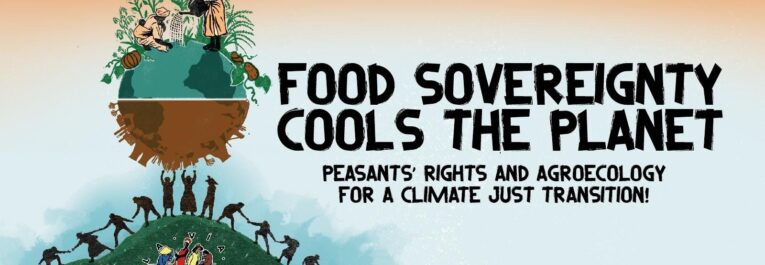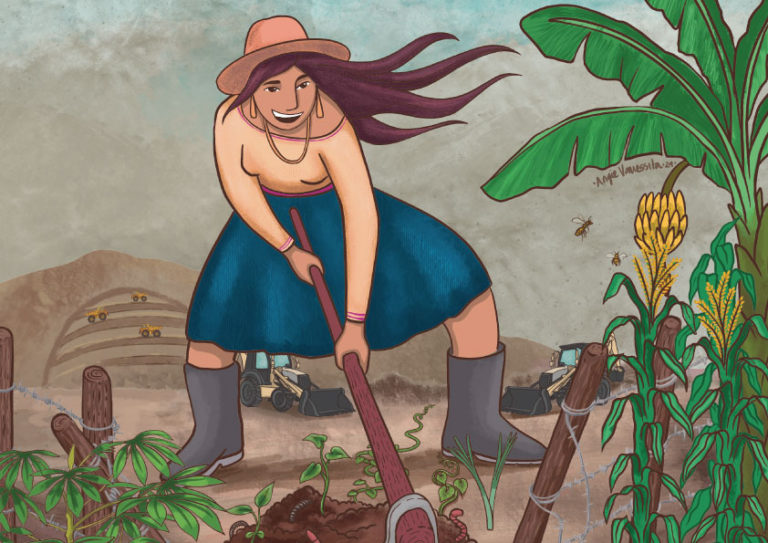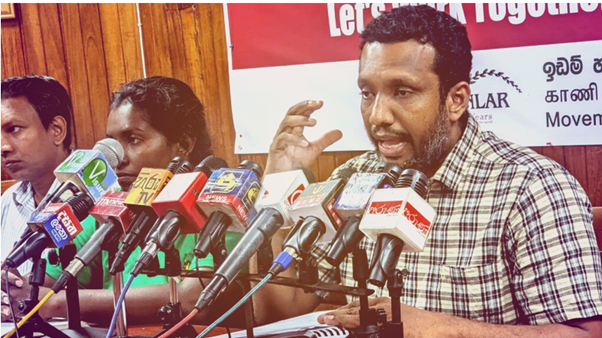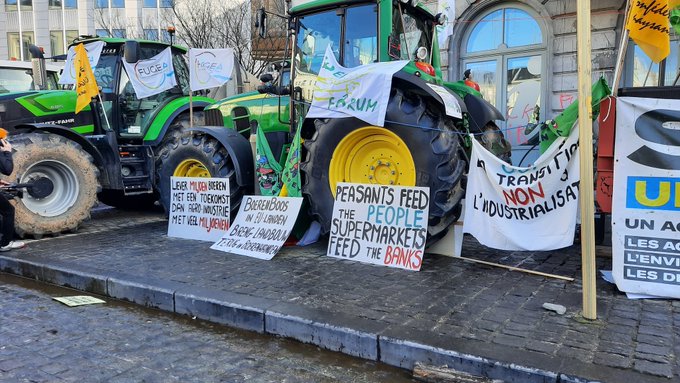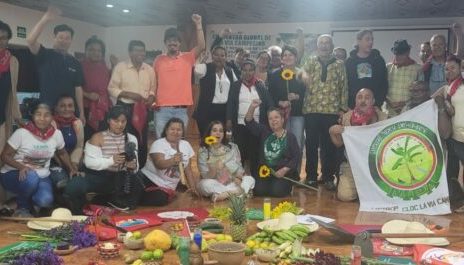Side event at the UN: Challenges and best practices in promoting the rights of peasants and rural workers in Latin America
On 18 September 2025, on the occasion of the 60th session of the United Nations Human Rights Council, a parallel conference brought together actors committed to the protection of the rights of rural communities at the Palais des Nations in Geneva. Entitled “Advancing the rights of peasants and other people working in rural areas through UNDROP: challenges and good practices in Latin America”, the conference was co-organised by La Via Campesina, the World Forum of Fisher People and Fisher Workers (WFFP), FIAN International and CETIM, with the support of the Geneva Academy of Human Rights, RAISE and the Swiss coalition “Friends of the Declaration”, this conference was an opportunity to discuss major issues and innovative initiatives with rural movements and States committed to the rights of rural peoples in Latin America.
Among other things, the event aimed to highlight the multiple challenges currently facing rural communities around the world. It also sought to explore how the United Nations Declaration on the Rights of Peasants and Other People Working in Rural Areas (UNDROP) could influence legal and policy frameworks to better protect these communities, strengthen their rights and promote social justice. Finally, the event highlighted the mobilisation of peasant movements and rural organisations across Latin America, which are working at all levels to promote and implement the UNDROP.

As moderator, Sibylle Dirren, FIAN International’s representative to the UN, emphasised the crucial role of UNDROP as a powerful tool for defending and promoting the rights of rural communities.
Carlos Duarte, Chair of the UN Working Group of Experts on the Rights of Peasants and Other People Working in Rural Areas, recalled the critical situation of rural communities, which face dispossession, lack of access to land and water, and the grabbing of natural resources. He lamented the difficulties faced by rural organisations in making their voices heard in international forums, such as the COP or the Global Biodiversity Convention, even though peasant and other rural communities are directly concerned by biodiversity protection and climate issues. Mr. Duarte also pointed to the persecution and repression suffered by peasant leaders in many parts of the world. Finally, he stressed the need to strengthen the participation of rural women, who are often invisible despite being “the backbone of the peasant-rural world”.
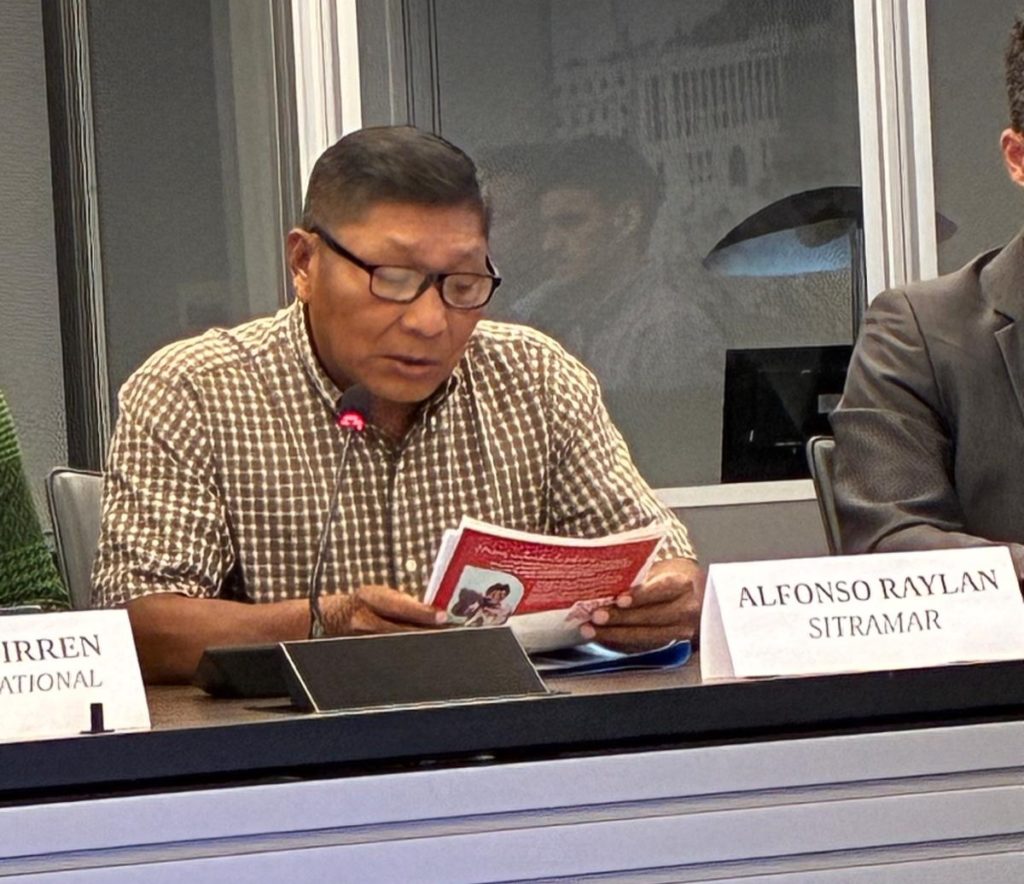
Alfonzo Simon Raylan, representative of the Sea Workers’ Union (SITRAMAR), a member organisation of the World Forum of Fisher Peoples, sounded the alarm on the situation of fishers in the indigenous region of Ngöbe-Buglé (Panama). Since 2010, under the pretext of environmental conservation, a fishing ban has deprived these communities of their main source of livelihood, exacerbating poverty and hunger. The populations live in difficult conditions, with limited access to education, healthcare and basic services. Mr. Raylan denounced the lack of state support and the violent repression suffered by indigenous peoples when they defend their rights.
Three representatives of La Via Campesina from Latin America shared their experiences via video message. Martha Huertas Moya, a member of FENACOA/La Via Campesina Colombia, gave an encouraging assessment of the situation of Colombia’s long-marginalised peasantry. The recognition of peasants’ rights in the country’s constitution and public policies has led to better land distribution and the guarantee of rights that were previously inaccessible. However, she stressed the need to create an agrarian and rural jurisdiction and to increase the budgets allocated to rural areas in order to consolidate these advances. Arturo Aliaga, member of ANAP/La Via Campesina Cuba, highlighted concrete advances in peasants’ rights, food sovereignty and agroecology in the country. The peasant representative stated that, thanks to the strong political will of the competent authorities and ANAP’s ability to participate directly in the development of public policies and the establishment of relevant legislative frameworks, the promotion and implementation of UNDROP is now a reality. Anderson Amaro, representative of MPA/La Via Campesina Brazil, presented how Brazilian rural social movements are mobilising the UNDROP in their struggle for decent living and working conditions. More specifically, the peasant leader discussed the ongoing advocacy strategy, which aims to integrate the Declaration into the work of actors in the national judicial system, relevant ministries, and the national and departmental parliamentary agenda.
Adriana Fillol Mazo, Professor at the University of Seville and the Geneva Academy, presented UNDROP as a concrete legal tool for protecting rural communities. However, she noted the existence of several threats, such as digitalisation and agricultural technologies that can increase dependence and exclusion. The lack of generational renewal also jeopardises the future of small-scale farming. Rural women also face significant obstacles in accessing land and a dignified life. Added to this are economic pressure, violence and climate uncertainty, which are causing a silent mental health crisis in rural areas. She concluded by calling for peasants, fishers and indigenous peoples to be seen not as problems to be managed, but as essential strategic partners in building fair, resilient and sustainable food systems.
Raffaele Morgantini, CETIM representative to the UN, closed the event on a hopeful note for rural communities, thanks to the emergence of progressive case law. Indeed, decisions favourable to rural peoples’ rights are appearing in several judicial systems. In Honduras, the Supreme Court invoked UNDROP to protect peasant seeds from the “Monsanto law”, a law passed by Parliament that favoured industrial seeds and was subsequently repealed. In Colombia, the Constitutional Court granted protection to a peasant couple forced to abandon their land after repeated flooding. In February 2020, the Inter-American Court of Human Rights issued a ruling ordering the reinstatement of an indigenous population on their ancestral land, using both UNDROP and UNDRIP (UN Declaration on the Rights of Indigenous Peoples). Other examples exist in Kenya and Canada, covering rights related to seeds and health. Mr. Morgantini stressed that these advances would not have been possible without strong alliances between peasant and rural movements, human rights defenders, lawyers, academics and the commitment of public authorities. These collaborations make it possible to transform principles into concrete actions in rural communities, courts and national policies.
Read our exclusive interview with Working Group Chair Carlos Duarte and our article on the Working Group’s report presented at the 60th session of the Human Rights Council.

